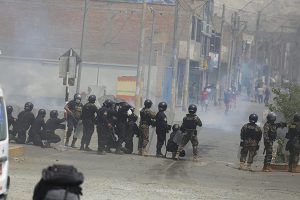Bloomberg
Peru’s leader declared a curfew in the capital Lima to stem violent protests against inflation that have intensified in recent days, leading to clashes with police, temporary food shortages and supply-chain disruptions.
President Pedro Castillo announced the curfew in an address to the nation while declaring a state of emergency in Lima and the nearby port city of Callao. The curfew will run from 2 am local time to 11:59 pm, he said.
Lawmakers and senior officials will be able to work as normal, and citizens in essential businesses like pharmacies and supermarkets will be allowed to move about the city, Minister of Justice Felix Chero said in an interview with Radio Exitosa.
Castillo, who just survived a second impeachment attempt by congress, lowered fuel taxes and increased the minimum wage by 10% over the weekend to help Peruvians struggling with the fastest inflation in 24 years. Yet the measures did little to appease bus drivers, most of them working
informal jobs without fixed salaries.
The government deployed the army after bus drivers blocked highways as part of a strike, extending a crisis that started when protesting truckers and farmers interrupted the supply of food to the capital. The country’s agricultural exports, including blueberries, avocados and grapes, are now suffering disruptions, according to an association of exporters. Housewives angry with rising food costs also joined the protests and local media showed mini-markets being looted in the southern region of Ica. School classes were suspended until Tuesday amid the chaos.
Consumer prices in Lima rose 6.82% in March from a year earlier, the most since August 1998, the national statistics bureau said.
 The Gulf Time Newspaper One of the finest business newspapers in the UAE brought to you by our professional writers and editors.
The Gulf Time Newspaper One of the finest business newspapers in the UAE brought to you by our professional writers and editors.
